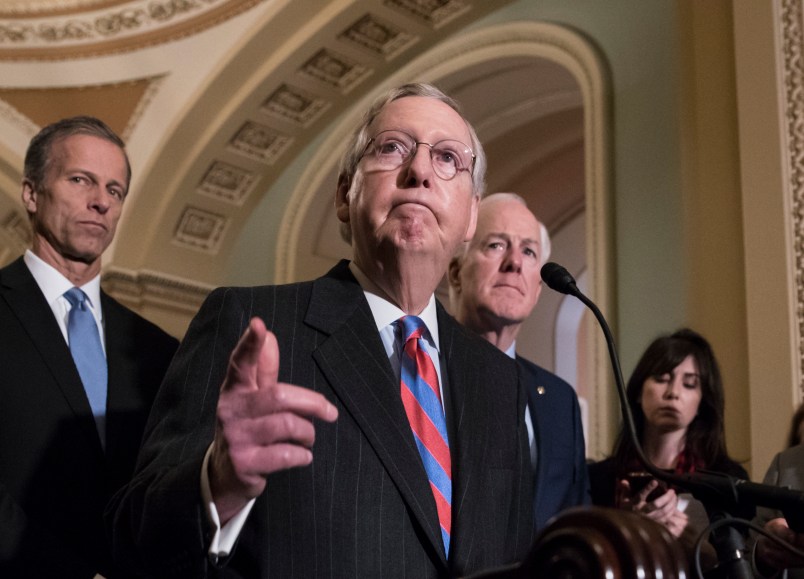In a speech on the Senate floor on Monday, Senate Majority Mitch McConnell (R-KY) reiterated his promise to Sen. Susan Collins (R-ME) to hold votes this week on three policies to mitigate the damage the tax bill would do to the nation’s health insurance markets. Collins originally said her vote for the tax bill—which is scheduled to happen either Tuesday or Wednesday—would depend on whether the other policies become law. But the vote on the continuing resolution to fund the government and the bills McConnell plans to attach to it, won’t happen until later in the week, making her promise Monday to support the tax bill a giant leap of faith.
“We must pass a routine waiver to avoid unacceptable cuts in Medicare funding and other vital programs,” McConnell said, referring to Congress’ PAYGO law that unless waived would trigger hundreds of billions of dollars in cuts to federal programs due to the tax bill’s $1 trillion-plus price tag.
“And of particular importance,” he continued, “faced with the continued failure of Obamacare to keep health insurance affordable for working Americans, we must take this opportunity to pass bipartisan solutions that will help stabilize collapsing health insurance markets and lower premiums for individuals and families across the country.”
McConnell is presumably referring to two health policies Collins demanded in exchange for her vote on the tax bill—one to restore government subsidies to insurance companies that Trump cut off earlier this year, and the other to set up a temporary federal reinsurance program.
Lamar Alexander (R-TN), the co-author of the first bill, also pledged that it would be attached to the funding bill that must pass before midnight Friday to avoid a government shutdown.
The bills are aimed at balancing out the expected insurance premium hikes caused by the tax bill’s repeal of Obamacare’s individual mandate, though health care experts say they would do little to prevent the number of uninsured Americans by jumping by at least 13 million over 10 years.
Despite McConnell’s promise to hold votes on the bills and the likelihood of their passage in the Senate, Republicans in the House could vote to strip them out, setting up a showdown between the two chambers with a shutdown looming. House Republicans have long been hostile to Collins’ health care bills, deriding them as “welfare” and a “bailout” for insurance companies—though insurers are compelled to provide the subsidies to low-income patients whether or not the government reimburses them.
Regardless, Collins will be in the dark about whether her market stabilization bills will ever become law when she decides how to vote on a tax bill that nukes the individual mandate.






